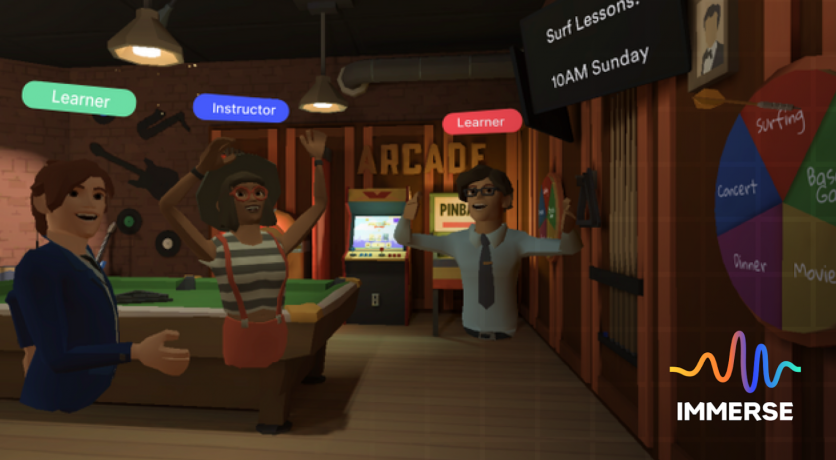Full immersion learning is the ultimate experience for those seeking to become fluent in a new language. It allows the learner to step into a virtual environment where language is spoken all around them, rather than just memorized in a book or on a whiteboard, and leverages context, culture, and community to allow learners to absorb language in a more natural and effective way.
Unfortunately, immersive language learning is far less accessible than the more common, and less effective, classroom or traditional phone app experience. Few students have the time or the resources to spend six months in Barcelona learning Spanish or a semester in Paris learning French. As a result, far too few ever achieve the conversational fluency that they desire - but all of that is about to change.
By providing access to the ever-expanding landscape of the metaverse, virtual reality (VR) has opened the door for countless students to step into new virtual realms and learn in new ways. VR has made immersive learning accessible to the masses.
"Immersive learning in the metaverse has the potential to revolutionize education," says Greg Sugar, VP of Operations at LineZero. "Devices like the Meta Quest offer personalized and engaging experiences for learners, allowing them to feel present in practical scenarios that students would often only read about or view on a screen."
LineZero is a trusted Workplace from Meta Partner that helps enterprises improve organizational communications, grow employee engagement, and create a positive work culture through digital solutions.
"Immersive learning can help students to retain information better and rapidly develop skills as they can virtually 'do surgery,' train 'on an oil rig,' and be virtually 'present' in emulated real-life scenarios," Sugar explains. "It can overcome the limitations of traditional classroom learning and also allow for more equitable access to world-class education and learning experiences."
Leveraging the metaverse for language learning
As access to the metaverse has expanded, language educators have quickly moved into the space. Their innovative programs combine the latest technology with proven language learning models to give students an authentic and effective immersive experience.
"A carefully constructed virtual world creates a sense of realism, immersing you in a space where you can interact with people and objects naturally, like you would out in the real world," says Quinn Taber, Founder and CEO of Immerse. "This lets your brain activate its full language learning network so you can learn a new language in much the same way you learned your first."
Immerse is a language immersion platform that is reshaping how people learn new languages, rapidly accelerating their conversational fluency skills with live classes led by expert language instructors in fully-interactive virtual locations. Immerse's virtual world allows people to connect, socialize, and build fluency together from any location in VR or using their desktop application. Meta has named Immerse its first and only preferred partner for language learning in the metaverse.

"VR technology has turned out to be a total game-changer, making live language immersion experiences possible anywhere there's internet and much more affordable," Taber explains. "VR language immersion opportunities can be as casual as making new friends on VR social platforms or as organized as learning with a VR language app."
How the metaverse improves language learning
Providing access to immersive experiences is one of the top benefits of bringing VR into the education space, but it is not the only one. Research has found that teaching in the metaverse has the potential to improve the educational experience in a number of ways. For example, researchers have found that students in VR classrooms learn new vocabulary words 2 times faster than those in traditional classroom settings. VR has also been shown to help reduce the distractions that students experience in a normal classroom setting.
"One of the most prominent researchers in VR and language learning from the University of North Texas has repeatedly found that VR benefits learning by reducing distractions," shares Taber. "VR fully immerses learners in the learning context. This means that they can fully focus on the language they are learning without being tempted to check their phones or be distracted by other things going on around them."
Taking learning to the metaverse also allows remote learners to engage in a supportive and interactive community. The American Council on the Teaching of Foreign Languages cites community as one of the five core components necessary for successful language learning. Platforms like Immerse take the classroom experience to the next level by allowing students to create a thriving community of learners who share a similar passion for pursuing language and cultural fluency.
Foreign language anxiety, which triggers feelings of worry and apprehension in those learning new languages, is one of the biggest challenges teachers face in language instruction. Students learning languages in the metaverse, however, have been shown to struggle less with language anxiety.
"A recent meta-analysis examining previous research on foreign language anxiety and learning reported that anxiety has consistently been found to be detrimental to language learning," Taber reports. "However, recent research conducted at the University of Illinois at Urbana-Champaign found that being represented by an avatar in VR significantly reduces both perceived and physiological anxiety, which allows you to become fluent faster."
By addressing all of these challenges, the metaverse dramatically increases the student's likelihood of success. Immerse has found that 98.8 percent of its learners report that using the platform improves their foreign language speaking abilities. In addition, when compared with those who learned in a traditional language classroom, students who used Immerse scored an average of 56 percent higher on standardized language proficiency tests. Immerse students also improved their scores 6 times faster than what is expected from classroom learning.
The metaverse has the potential to allow students to more readily connect with the three main pillars of language immersion: context, cultural experiences, and community. The work that organizations like Immerse are doing to package and provide access to those pillars promises to revolutionize the world of language learning.
"When learners can immerse themselves in realistic situations where they can have live conversations with others, fluency happens faster," says Taber. "Bringing language learning to the metaverse allows learners to gain the language skills they need to achieve their goals from day one."




